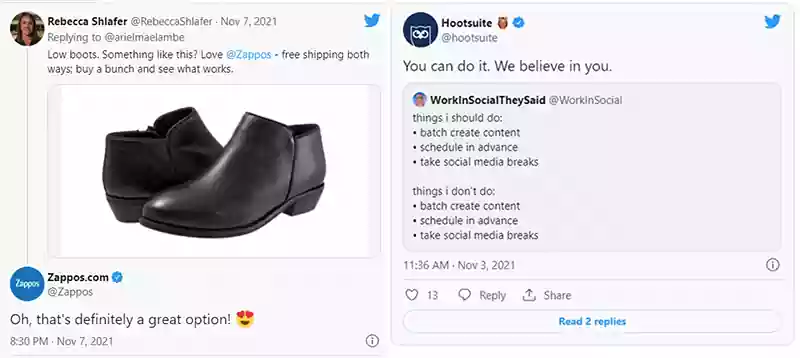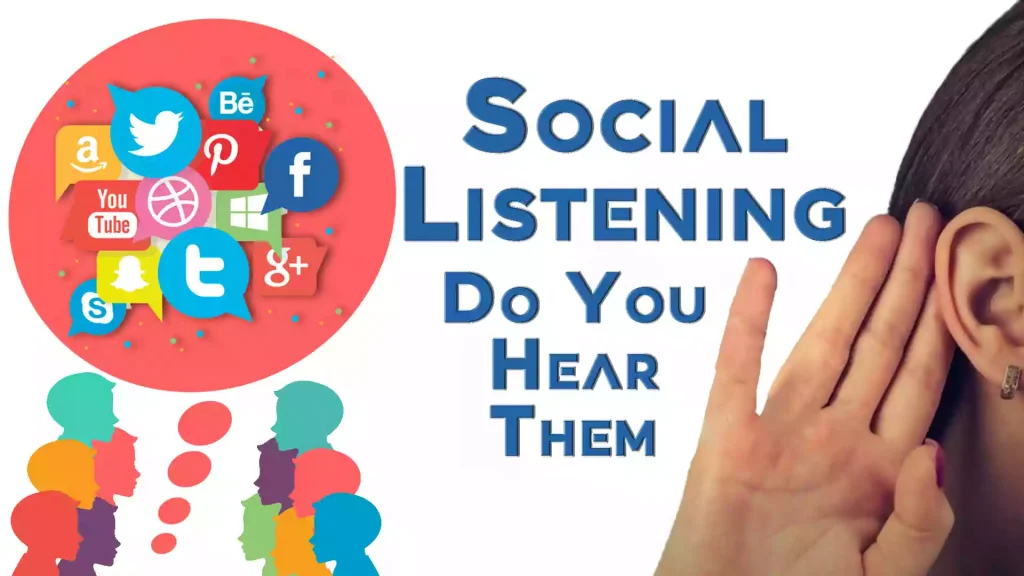How To Use Social Listening To Boost Brand Awareness Reach And Sales?
What Is Social Listening?
Social listening is the process of monitoring conversations on the Internet and social media platforms for mentions of your brand, competitors, emerging trends, and any variety of keyword phrases that you choose to target.
You use these conversations to gather information about your target audience, It helps you understand their needs, interests, concerns, opinions, etc. Social listening is a great way to improve your brand's engagement and, ultimately, its sales.
Whether you are actively pursuing a social media marketing campaign or not, an active process for social listening and listening for and reacting to brand mentions can significantly improve your business.
Marketing with Social media is a great way to get your business in front of people interested in your product or service. Social listening can help you learn more about what matters most to your audience. It's also a great way to find out what customers think about your brand, products, services, etc.
This article will teach you about social listening and why it matters for your business. You will see examples of social listening in action. Plus, we will show you how to do it for free and compare the best social listening tools available to your small business.
How Does Social Listening Work?
When you listen to your audience, you can hear them talk about themselves, their problems, their hopes, their dreams, and other topics related to your industry. These conversations happen through different channels such as blogs, forums, groups, review sites, social networks, videos, and more.
The key here is to identify which social channel your ideal customers use. And then you need to figure out what they're saying.
Once you have identified the proper channels, you can start using those channels to engage with your audience. For example, by posting comments on relevant blog posts, commenting on forum threads, joining discussion groups, liking pages on Facebook, tweeting about your company, sharing content from your website, and many others.
Once you've engaged with your audience, you can analyze the data collected to determine what works best for your business.
Considering the statistics below, it is evident that you should have a distinct advantage just by doing social listening and making an effort.
A strong social listening strategy finds the root causes behind social conversations and implements long-term strategy changes.
With social listening, you can utilize the information learned to create the kind of content your followers want. Develop new ideas and strategies based on industry trends, improve your customer experience by interacting directly with customers, and continuously shift your customer strategy to fit the current need.
Why Does Social Listening Matter?
There are three main reasons why social listening matters:
1) To Find New Customers
2) To Improve Customer Service
3) To Increase Sales Conversions
Let's take a look at each one of these reasons.
Reason 1 - To Find New Customers
One of the biggest benefits of social listening is that it allows you to find new customers.
If you don't have any leads yet or an email list, you can use a social listening tool to find potential customers and build subscribers. When you receive alerts regarding the mention of something you are tracking, go through the results and read the comments left by the contributors. Do they match your target audience profile?
You'll notice that some of the comments mention specific companies or brands, pain points, and success stories. There might be a market opportunity for you to sell your products or services to the companies and brands. The pain points and success stories can help you with product features as well as give you bullet points to address in your copy.
You can always follow up with them directly to the messages. Ask questions, offer a discount, ask for feedback, etc. Build trust and gain their interest so that they eventually become your customer.
Reason 2 - To Improve Customer Service
Another benefit of social listening is that you can improve customer service.
You can monitor conversations happening online to learn what your customers want, how they feel, and what issues they encounter when using your product/service. It helps you improve the quality of customer care provided.
You can also use this knowledge to improve your communication skills. By understanding your customers' needs, you will be better equipped to provide the kind of experience that makes them happy.
This way, you can avoid losing customers because you weren't able to satisfy their needs.
Reason 3 - To Increase Sales Conversions (and Other Marketing Metrics)
Finally, another reason why social listening matters is that you can increase conversions.
By monitoring your competitors, you'll know exactly what strategies they're using to get more traffic, leads, and sales. You can then implement similar strategies in order to increase your own conversion rates.
For example, if you notice that most people who visit your competitor's site end up abandoning their cart without buying anything, you can try doing something different. You can run a specific ad targeting abandoned carts on their website.
When someone visits social media after abandoning their cart on your competitor's site, they will be presented with your ad. The work of building interest has already been done for you, now it's your job to close the sale yourself.
In addition to increasing conversions, social listening helps you track other marketing metrics such as bounce rate, time spent on page, etc. This information is very valuable since it gives you insight into which pages and posts work well and which ones don't.
What's The Difference Between Social Listening And Social Monitoring?
Social monitoring is simply tracking mentions of your brand or specific phrases that you designate online. Social listening is social monitoring plus the ability to aggregate, analyze, respond and react to the conversations occurring around brand mentions and the phrases that you are tracking in real-time as they occur.
Social monitoring tools track mentions of your brand and often do not include the ability to analyze or respond to conversations. Social monitoring is very basic and treats each mention separately.
Social listening entails having a two-way conversation with customers. Social listening helps you understand the bigger picture by aggregating data from real-time messages. The ability to continuously analyze mentions and conversations in real-time gives you the advantage of being able to respond as it happens and have better control over a conversation.
Social listening tools allow you to aggregate, monitor, track and analyze all conversations, sentiments, and trends around your brand and phrases that you designate.
Active social monitoring or social listening both start with monitoring social networks like Twitter, Facebook, Pinterest, Instagram, LinkedIn, and others but also should include forums, relevant websites, and the entire web in general. You never know where someone may decide to talk about you. The tool or tools that you choose will affect the reach of your listening abilities.
Social listening enables you to find the root cause of issues, proactively make changes, and anticipate needs. It gives you a better understanding of what customers are saying about you, what they're interested in, and how they feel about your brand.
Joining the social discussion is key to using social listening as a tool to improve your business and not just another task. Active listening gives you distinct advantages over your competitors. not only can you monitor your brand mentions, you can also use it to monitor competitors, identify trends before they are obvious, identify relevant influencers and product opportunities, and a lot of other things as well.
We will review both free and paid tools to accomplish social monitoring and social listening further along in this article.
How To Use Social Listening To Improve Your Business?
Developing a solid social listening strategy will allow you to track consumer sentiment and trends in real-time. People are more likely to be candid when they are not speaking directly to a company representative. The 16 methods listed below are just some of the ways to utilize social listening to your advantage.
Social listening should improve your business decisions and can impact almost every aspect of your business. Use it to plan strategy create your content map, and as mentioned in the examples above, it is a great way to develop leads and new business
Social listening also gives you an advantage over businesses that do not actively use it. Use it to stay to monitor your competitors, identifying opportunities and or needs that you can fill. I particularly like responding to and helping competitors' customers that need help or a different product.
Shoulder niches would be a product within your category that you don't compete with but share the same audience. You sell baseball gloves, I sell baseballs and bats. We share the same audience. There is no reason why your audience wouldn't be interested in my products, they may just not know who we are yet.
I enjoy answering questions on competitors' Amazon listings, answering with positive answers about their business. Either way, when that potential buyer goes back out to search and sees my logo they will come to look at my product as well because I just helped them out.
It is also a great way to find influencers. Social media listening is a great way to identify and find the right influencers for your brand. Monitor the best hashtags for your brand and learn who is talking about it the most on the different social channels. You will find that it is a great way to discover effective influencers for you to work with.
Social Listening Examples

Coke uses social media listening to inform decisions regarding acquisitions and diversification
How Can Social Listening Improve My Products?
Social listening is an always-on resource that lets you determine what features and products your audience wants – and which they don't.
Coke uses it to identify new trends and open new channels for business and product innovation by listening to what consumers say on the various social media channels. Once, it was just a soda company with seven different soda brands. Coke has grown to include over 200 brands worldwide, including coffee, tea, juicy, dairy, soda, and water. Some brands are region-specific.
They also use social listening for sentiment analysis after a new product is released. Using it to monitor regional trends and preferences to inform their acquisitions and expansion has paid off for them. Their product lineup speaks volumes about the quality of their methods.
In 2010, Wendy's was redoing their menu and releasing a new type of French Fry's, and they were adding salt on them. They were very concerned with how people would react to the inclusion of salt.
They monitored conversations and learned that sea salt was a less harmful type of salt. They rolled out their product using sea salt, promoted it that way, and it was a very successful rollout.

Taco Bell had its own 'aha moment' using social listening. There aren't too many meatless fast food options available for vegans. When Taco Bell announced they would remove potatoes from their menu completely in 2020, it was not well received by consumers and vegans. The social media data showed consumers were not happy.
They received quite a bit of pushback across social media platforms. There used to be a saying in corporate America that you know it is going to be a rough week when there is a 60 Minutes news crew waiting for you at your office on Monday morning. Taco Bell was having one of those moments after making the announcement and putting it in place. It was even picked up by the media and national news organizations and made it to the evening news across the country.

It took Taco Bell months to realize how big of a mistake the decision had been. The feedback was overwhelming. Whatever social listening tool they were using did not tell them enough, quick enough either.
Conversations like this also help identify emotional levers that your audience responds to.
The posts and conversations provided plenty of actionable insights and indicated they had made a terrible decision.
It also indicated they had opportunities to make the best of the conversation by coming up with additional meatless options.
Their self-inflicted fiasco enabled them to capitalize on their mistake with the reintroduction of an expanded menu, improving their negative brand mention problem.

Listening to the Voice of the Customer
Taco Bell paid attention to the voice of their customer and the negative sentiment created by the original decision. They capitalized on what they had learned and turned the return of potatoes into a major PR success. As you can see by the announcement, they started premarketing and building hype for the return of potatoes a full 3 months before the release date.
Since only a short time had passed since they had made the original move, it was easier to get wide coverage of the reintroduction of potatoes because the media and news love to report on story updates.
Create An Authentic, Personalized Experience
Social isn't just about communicating about your brand - it's also a crucial part of customer experience. Brands must capture company data and consumer and cultural insight at every touch point to create an authentic, personalized experience. A thorough understanding of your buyer personas is fundamental.
Brands must use social insights to learn what customers love and improve on or eliminate what they don't love. Social must be about them, not about the brand or product.
Selling should be a tiny part of your social content. To be successful in this endeavor, brands must have data intelligence informing every decision and touchpoint with the customer.
In 2010, a now Grammy-winning artist was starting and having many difficulties promoting her album. Her first album was a flop. She had a new manager now and a new direction. We were hired to help promote her music. It was much easier than gathering and monitoring data on the web.
We monitored social media for mentions of her contemporaries. When someone mentioned her peers, we would auto DM them a personalized message from her with a link to a sample of her music. If they listened to the entire selection, we would send them a small discount on the upcoming album

Design Successful Campaigns Using Social Data
Social listening is an essential component of promotional campaigns. Real-time information helps to identify trends and influencers quickly. Monitoring social media channels and customer feedback is necessary to determine sentiment around sponsorships and other relationships with critical stakeholders and brand sponsors.
Use user-generated content (UGC) tactics to tailor your promotional campaigns to specific audiences. Remember, 92% of consumers believe strangers' recommendations over what a brand says about itself. Improve your social selling by incorporating UGC in your campaigns.
The iHeartRadio Awards Show is a popular social voting category that allows brands to make real-time course corrections and product launches.
Use social listening tools to monitor trends and adjust your marketing accordingly. Identify the topics/trends your target audience profile cares about most.
Craft campaigns that resonate with your audience on a personal level. Use influencers, social media, email marketing, and other online platforms to get your message out. Monitor the reaction of your audience in real-time to adjust the course as needed

Understand Sentiment To Track Brand Health
Public sentiment is the core of all social analytics and is used to measure brand health. Focus on two metrics when looking at comments to determine sentiment and health. Are the comments positive or negative, and how much passion is behind what is said.
When measuring customer sentiment, it's essential to look at spikes in sentiment and values over time to assess the impact of events.
Peloton faced a parody attack which caused negative sentiments towards the company. Within days of their product being negatively portrayed on tv, they were able to get the same actors, Internet celebrities themselves, to parody the tv show in an ad spot, and it blew up in their face.

Pelotons' blunders destroyed the image of the brand
The brand misinterpreted feedback about its holiday commercial, and as a result, its stock dived. Brand mentions and brand health spiraled downward, with sentiment reaching 4%.
The same brand, Peloton successfully boosted sentiment this year by displaying their own negative reviews using a clever method. They ran ads showcasing negative comments like "overpriced coat rack"-followed by those same people praising them a few years later. No one likes to share bad reviews and when they do it is normally to bash the reviewer which is unprofessional. Peloton balanced the negative reviews with positive reviews from what appear to be the same users.
Sharing negative reviews claiming the criticism is not valid can easily backfire unless you have hard proof that you can show that the criticism was never justified, to begin with. Don't overdo it, be honest and authentic. Understand sentiment to track brand health. Look for spikes in sentiment and determine the cause. Respond to these spikes in a way that preserves brand health.
Are There Free Social Listening Tools?
Perhaps you’re just starting in business, or you want to get your feet wet with social listening without spending on expensive tools; free tools and methods are available. You can use tools like Facebooks Insights, Twitter Analytics, and Reddit Search. However, using a platform-specific tool, you limit yourself to a tiny subset of your social network.
You can use Google Alerts to monitor your brand name, competitors, and even industry keywords across the internet. However, it doesn't monitor social media sites and only allows you to monitor one phrase at a time. Each phrase requires a separate alert. The alerts are delivered as email messages to your mailbox, or you can create an RSS feed out of them.
Consider installing a free extension such as SocialAnalyzer Chrome Extension if you want to drill deeper into what people say. SocialAnalyzer saves you time and effort, quickly finding the trending topics on Facebook & YouTube & Twitter, and get social media monitoring and analytics to help you quickly get an audience profile.
Talkwalker Alerts, Social Mention, and Social Searcher are all free tools that offer phrase and keyword monitoring. You get real-time email alerts from all three, so you can quickly respond to online conversations about your company. Social Mention also includes an analytics tool that lets you see how often your keyword appears on various social networks (Twitter, Instagram, Facebook, etc.). Social Searcher also shows how your keyword/phrase correlates with other words across social networks.
The Best Social Listening Tools Comparison
The following tools offer many different insights, sentiment analysis, social conversation monitoring, analytics, customer experience, online and offline metrics, social media management, and more. They provide insight, ranging from cloud-based software with comprehensive dashboards to simple online tools.
They range in pricing from free to over-the-top monthly payments. These tools should not only be part of your social media strategy, they should be incorporated throughout your larger digital marketing strategy.
Only you can determine what an excellent fit for your business is. Whatever you decide to do to achieve the level of social listening and social media measurement you want, it is on you to make the best use of the social listening tools you choose.
It might be best to start with one of the free social media monitoring tools and get a handle on what type of information is available before deciding to take the plunge into something more expensive.
You will notice that I left out single platform tools such as TweetDeck. While practical, too many tools quickly make us ineffective.

Tool Name | Prices | Free / Trial / Demo | Single Tool / Multitool | Sites | Main Features | Reply Within Tool? |
|---|---|---|---|---|---|---|
- Free | - Free | - Chrome Extension | - Facebook | - Media monitoring | - No | |
- Free | - Free | - Single Tool | - Twitter | - Mentions feed | - No | |
- Free | - Free | - Single Tool | - Monitors everything across the internet & is all inclusive | - Email Alerts | - No | |
- Free | - Free | - Single Tool | - Web pages | - Email Alerts | - No | |
- Free plan | - Free | - Single Tool | - Twitter | - Email Alerts | - No | |
- Free | - Free Plan | - Social Media Multitool | - Twitter | - Live stream of activities | - Yes | |
- Free | - Free plan | - Social Media Multitool | - Pinterest | - Listening and monitoring | - No | |
- Free | - Free plan | - Social Media Multitool | - Twitter | - Unlimited social stream | - Yes | |
- Free | - Free plan | - Single Tool | - Twitter | - Real-Time Monitoring | - Yes | |
- $49 per month | - 30-day free trial | - Social Media Multitool | - Facebook | - Brand and keyword monitoring | - Yes | |
- $49 per month | - Free Trial | - Social Media Multitool- | - Scans the entire web (news sites, blogs, reviews sites, forums and ANY website) | - Social listening by products, categories, and topics | Yes | |
- $49 per month | - 15-day free trial | - Social Media Multitool | - Twitter | - Social inbox | - Yes | |
- $49 per month | - 14-day free trial | - Single Tool | - Twitter | - Mentions feed | - No | |
- $99/user/month | - 30-day free trial | - Social Media Multitool | - Twitter | - Smart inbox | - Yes | |
- $165 per month | - Free tools | - Single Tool | - Twitter | - Hashtag and keyword tracking | - Yes | |
- Free Trial | - Free Trial | - Single Tool | - Twitter | - Monitoring of social media and mainstream channels | - Yes | |
- Starting at $200 per month | - Free Demo | - Marketing Automation Tool | - Twitter | - Social inbox - Integration with CRM (for monitoring leads and customers) | - Yes | |
Starting at $399 per month Prices depend on features chosen | - Free Trial | - Social Media Multitool | - Website monitoring - YouTube - Tripadvisor - Forums - Blogs - Comments & more | - Social listening by products, categories, and topics | - No | |
- $1,000 per month - Enterprise pricing | - Free Demo | - Social Media Multitool | -Twitter - LinkedIn | - Social listening by products, categories, and topics | - Yes | |
- $8,400 per year | - Free Demo | - Single Tool | - 10+ social networks | - Media tracking | - Yes |
Whether you decide to use social media listening tools or you decide to wing it with the free email alert tools, what is important is that you are doing something.
People that read this article also read these articles
A Strong Social Listening Strategy Will Boost Your Business
A robust social listening strategy can provide a well-rounded look at perceptions of your business because you can pay attention to what everyone is saying about your company online, not just your followers or customers. At a bare minimum, you should actively use social media listening for this purpose.
Whether you are tracking your brand's reach and presence online, using it to discover new sources of traffic, or sourcing brand mentions and looking at sentiment analysis, social listening can provide this and even more possibly important information.
I learned 2 decades ago that most businesses are not very secure with their essential data. Since it is a business, its employees tend to assume it is more secure than their home computers, which often isn't the case. Companies that deal business to business are the worst about security which makes little sense. At the time, I thought I needed to learn how to hack to gain competitive info, and I quickly learned that mastering Google Dorks was free and not illegal.
My point is to monitor your competitors with the right Google Advanced Search Operators(Dorks); you never know what you might find. Setting up a free Google alert with your competitors' URL +xlx|xlsx|doc|docx would reveal any excel or word docs on their server unprotected, and you would get an email about it.
Things I have gotten notified of automatically in the past: new secret manufacturers, marketing plans, new hires, sexual harassment claims, new hire salary negotiations with a current employee of ours, expansion plans, new feature specs, complete inventories, affairs, fraud, and outright theft.
With everything you have learned here and from other articles I've written, my point is to develop a system of automating an information flow that others don't pay attention to. When you find out a competitor just lost their resource connection, or you understand their costs, that is competitive information you can use to improve your business position.
Social listening should be part of your social media strategy. Take advantage of all the other things you can do to influence your greater digital marketing strategy and stay ahead of most of your competitors.
Social listening is a powerful tool for learning about your brand's reputation and interacting with customers. The more you monitor the Internet, the more you will get out of this process. So make it a priority to listen to what your audience is saying online as often as possible.


